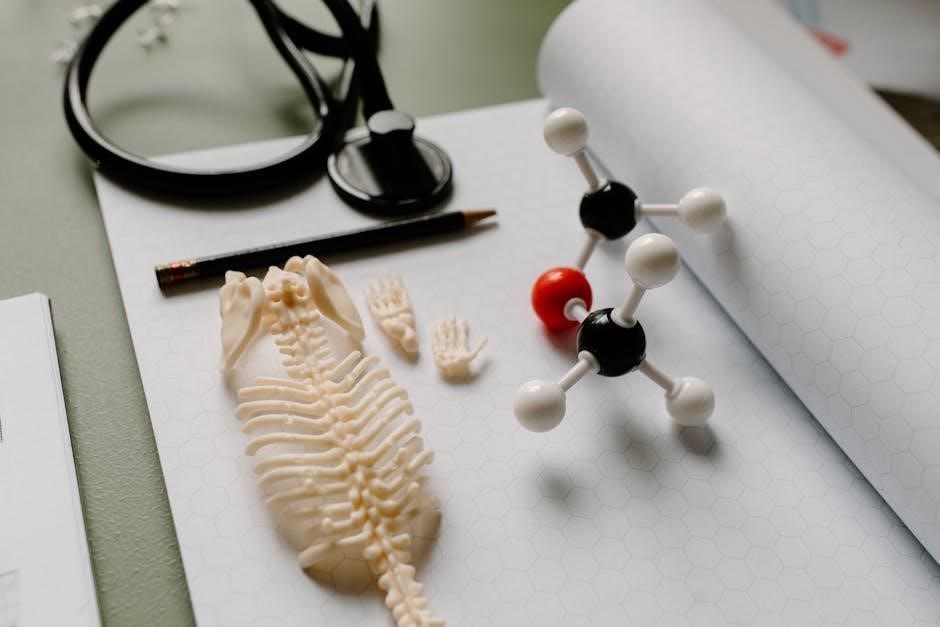This comprehensive Chemistry Study Guide PDF serves as an essential resource for students, covering fundamental concepts, key topics, and practical strategies for mastering chemistry.
It includes detailed explanations, practice problems, and video links, providing a structured approach to learning and preparing for exams effectively.
Overview of the Study Guide
The Chemistry Study Guide PDF is a comprehensive resource designed to aid students in mastering key chemistry concepts. Organized according to general chemistry syllabi, it covers essential topics like atomic structure, chemical bonding, and thermodynamics. Each chapter is divided into manageable subtopics, making it easy to follow and review. The guide includes practice problems with worked solutions, quizzes, and video links for enhanced learning. It aligns with standard textbooks and is tailored to help students prepare for exams, including the ACS General Chemistry Exam. Regularly updated, it ensures students have access to the most relevant and accurate information for their studies.
Importance of Using a Study Guide in Chemistry
A chemistry study guide is an invaluable tool for students, offering a structured approach to understanding complex concepts and improving problem-solving skills; It provides a concise and organized format, making it easier to grasp difficult topics like atomic structure and chemical reactions. Regular use of a study guide enhances exam preparation, boosts confidence, and ensures a strong foundation in chemistry. By focusing on key concepts and providing practice problems, it helps students identify weaknesses and improve efficiently. Ultimately, a study guide is essential for mastering chemistry, as it simplifies learning and equips students with the skills needed for academic success.
Structure and Organization of the PDF Guide
The Chemistry Study Guide PDF is meticulously structured to ensure clarity and accessibility. Organized into logical chapters, it covers core topics such as matter, measurement, and chemical reactions. Each chapter is further divided into subtopics, allowing students to focus on specific areas. The guide includes practice problems, sample questions, and video links to reinforce learning. Designed to align with syllabus requirements, it provides a sequential approach to mastering chemistry. Additional features like clear explanations, diagrams, and worked-out solutions enhance understanding. This well-organized format makes it easy for students to navigate and review material effectively, ensuring a comprehensive learning experience.

Key Concepts Covered in the Study Guide
The study guide covers essential chemistry topics, including atomic structure, chemical bonding, periodic table, reactions, stoichiometry, thermodynamics, and kinetics, providing a solid foundation for understanding chemistry principles.
Atomic Structure and Periodic Table
The study guide begins with a detailed exploration of atomic structure, focusing on the composition of atoms, including protons, neutrons, and electrons. It delves into electron configuration, emphasizing the importance of understanding orbital filling and valence electrons. The periodic table is introduced as a foundational tool, highlighting its organization by atomic number and recurring chemical properties. Key concepts such as periodic trends—like atomic radius, electronegativity, and ionization energy—are thoroughly explained. The guide also explores how elements are grouped into families, such as alkali metals and noble gases, and their characteristic properties. Mastery of these concepts is essential for building a strong chemistry foundation and understanding chemical behavior and reactions.
Chemical Bonding and Molecular Structure
The study guide extensively covers chemical bonding and molecular structure, explaining the formation of ionic and covalent bonds. It explores how electrons are shared or transferred between atoms, emphasizing the role of electronegativity. The guide also delves into molecular geometry, discussing shapes like linear, trigonal planar, and tetrahedral, and their relation to bond angles. Key concepts such as bond strength, polarity, and the VSEPR theory are highlighted. Practical examples and diagrams illustrate how molecular structures influence chemical properties. This section provides a clear understanding of the principles governing molecular interactions, essential for predicting chemical behavior and reactions.
Chemical Reactions and Stoichiometry
This section of the study guide focuses on understanding chemical reactions and stoichiometry, which are central to chemistry. It explains how to write and balance chemical equations, calculate mole ratios, and determine limiting reagents. The guide also covers concepts like percent yield and empirical formulas, providing step-by-step solutions to practice problems. Additionally, it addresses gas stoichiometry and reaction rates, offering insights into the quantitative nature of chemical reactions. Practical examples and exercises help students master these essential skills, ensuring a strong foundation for solving complex problems in chemistry.
Thermodynamics and Kinetics
This section explores the principles of thermodynamics and kinetics, focusing on energy changes and reaction rates. It delves into key concepts such as enthalpy, entropy, and Gibbs free energy, explaining their roles in determining the spontaneity of reactions. The guide also covers laws of thermodynamics and their practical applications. For kinetics, it examines factors influencing reaction rates, such as concentration, temperature, and catalysts, and discusses mechanisms and rate laws. Practical examples and exercises help students grasp these principles, enabling them to analyze and predict reaction outcomes effectively. This section is crucial for understanding the dynamic and energetic aspects of chemical processes.

Problem-Solving Strategies
This section equips students with effective methods to tackle chemical problems systematically. It emphasizes logical thinking, step-by-step analysis, and the use of formulas and concepts to arrive at solutions.
Approaches to Solving Chemical Problems
Mastering chemical problems requires a systematic approach. Start by breaking down complex problems into smaller, manageable parts. Identify the key concepts, such as chemical equations or stoichiometry, and apply relevant formulas. Use dimensional analysis to ensure units cancel out correctly. Practice active thinking by questioning what the problem is asking and how to reach the solution. Regularly review examples and worked-out solutions to build familiarity with problem types. Develop a habit of checking your work to catch errors early. Consistent practice and logical reasoning are essential for excelling in chemistry problem-solving.
Practicing with Sample Problems
Practicing with sample problems is a cornerstone of chemistry mastery. The study guide includes a variety of problems, from basic calculations to complex scenarios, ensuring comprehensive understanding. Each problem is accompanied by detailed solutions, allowing students to track their progress and identify areas needing improvement. Regular practice helps build problem-solving skills, enhances conceptual clarity, and boosts confidence. By tackling different types of questions, students become adept at applying theories to real-world situations, preparing them for exams and future challenges in chemistry.

Exam Preparation Tips
Exam preparation requires a structured study plan, regular practice, and understanding exam formats to build confidence and achieve success in chemistry exams.

Understanding Exam Formats
Understanding exam formats is crucial for effective preparation. The study guide provides insights into common question types, such as multiple-choice, short-answer, and problem-solving sections. It also outlines the structure of the exam, including time allocations and weighting of topics. Familiarizing yourself with the format helps reduce anxiety and allows you to allocate your time wisely during the exam. The guide includes sample questions that mimic the actual exam, enabling you to practice and adapt to the expected style. By understanding the exam format, you can approach the test with confidence and maximize your performance in chemistry.
Time Management During Exams
Effective time management is vital for success in chemistry exams. Allocate specific time slots to each section based on question difficulty and your familiarity with the topics. Start with questions you find easier to build confidence and rhythm. Practice with sample exams to refine your pacing and avoid spending too much time on a single problem. Skim through the entire paper first to prioritize questions strategically. Use the study guide’s sample problems to simulate exam conditions and improve your speed. Remember to leave a few minutes at the end to review your answers. Good time management reduces anxiety and ensures you attempt all questions, maximizing your score in chemistry exams.
Reviewing and Revising Concepts
Regularly reviewing and revising chemistry concepts is crucial for long-term retention and exam success. Use the study guide to identify weak areas and focus on improving them. Start by summarizing key points in your own words, ensuring clarity and understanding. Practice problems with worked solutions help reinforce concepts and highlight common pitfalls. Dedicate time to revisiting difficult topics, breaking them into smaller, manageable sections. Reviewing notes and textbook chapters alongside the guide ensures a comprehensive understanding. Consistent revision builds confidence and familiarity with the material, making it easier to apply concepts during exams. Regular review sessions are essential for mastering chemistry effectively.

Additional Resources and References
Supplement your learning with recommended textbooks, educational websites, and online practice tests. These resources provide additional practice problems and in-depth explanations to enhance your chemistry understanding.

Recommended Textbooks and Websites
Enhance your chemistry knowledge with highly-rated textbooks like “Chemistry: The Central Science” and “Organic Chemistry” by J.G. Smith. Online resources such as Khan Academy, Coursera, and Chemistry LibreTexts offer detailed explanations, practice problems, and video tutorials. These platforms provide interactive learning experiences, making complex concepts more accessible. Additionally, websites like ACS Publications and ScienceDirect offer access to scientific articles and study materials. Utilize these resources to deepen your understanding and prepare for exams effectively. They complement the study guide, ensuring a well-rounded approach to mastering chemistry.
Utilizing Online Practice Tests
Online practice tests are invaluable for assessing your understanding of chemistry concepts. Websites like Khan Academy, Coursera, and Chemistry LibreTexts offer free practice exams and quizzes. These resources simulate actual exam conditions, helping you gauge your readiness. Additionally, platforms like Quizlet provide interactive flashcards and study games for active learning. The ACS General Chemistry Exam Study Guide also includes sample problems with solutions, enabling you to test your knowledge. Regularly using these tools helps identify weak areas, track progress, and build confidence. They complement the study guide, ensuring a well-rounded preparation strategy for achieving success in chemistry exams and beyond.
This Chemistry Study Guide PDF equips learners with essential tools and strategies to excel in their studies. By mastering key concepts and practicing regularly, students can build confidence and achieve academic success, fostering a lifelong appreciation for chemistry.
Final Tips for Success in Chemistry
To excel in chemistry, prioritize understanding core concepts over memorization. Regular practice with sample problems enhances problem-solving skills. Utilize online resources and study guides to supplement learning. Consistent revision and active participation in class discussions reinforce knowledge. Seek clarification on doubts promptly to avoid gaps in understanding. Time management during exams and a well-organized study plan are crucial for success. Embrace a growth mindset, as chemistry builds on previously learned material. By staying dedicated and proactive, students can master the subject and achieve their academic goals effectively.
Encouragement for Continuous Learning
Embrace curiosity and a passion for discovery to fuel your chemistry journey. Continuous learning is key to mastering this dynamic subject, as new breakthroughs and insights emerge regularly. Set achievable goals and celebrate progress, no matter how small. Leverage the wealth of resources, including study guides and online tools, to deepen your understanding. Engage in regular practice and seek to understand concepts rather than memorizing them. Stay updated with scientific advancements and apply theoretical knowledge to real-world problems. By maintaining a growth mindset and staying committed, you’ll not only excel in chemistry but also develop a lifelong appreciation for the sciences.